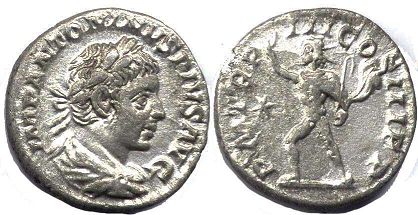Coins of Elagabalus (Heliogabalus) - catalog with values
Roman Emperor (218-222)

IMP ANTONINVS PIVS AVG
P M TR P III COS III P P
denarius 220
silver
17 mm.
Rome
Draped bust in a wreath right / Emperor Antoninus Pius Augustus
Sol left with a raised hand, holds lash / Great Pontífix People's Tribune Consul 3 times, Father of the Fatherland 3 times
Coin value ~ US$50-70
Costs of Elagabalus (Heliogabalus) coins in this catalog approximate and indicated specifically for the coin shown in the picture.
I do not buy or sell coins - this is just a catalog.
See other coins of Imperial Rome.

